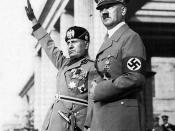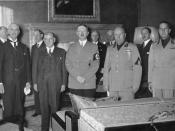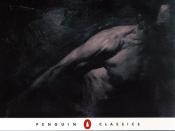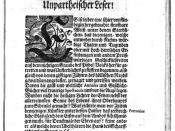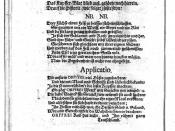The Worm Inside ManThere are very few uncivilized areas in the world today. The once blank spaces on our maps have been scratched in and filled up from border to border in every nation. It is an accepted fact of every day life that very few ever think to question. Students grow up learning history from the time they enter grade school, but almost none of them realize the horror it entails. Everyone knows World War II was bad ÃÂ but does everyone know about how families were ripped apart, individuals were treated like animals and set to work until they were more bones than skin, and men, women, and children alike were put to death in too many terrible ways to sanely contemplate? This was all because of one manÃÂs terrible and animalistic lust for power ÃÂ power over others he did not see as equal, power over their emotions, and power over their very existences.
This was just one tiny chapter in the terrible book of death that has been created by the lust inside every human ÃÂ a lust that the author Joseph Conrad acknowledges. In his brutally honest and scathing novel, Heart of Darkness, Conrad takes a look into the blackest depths of manÃÂs soul and finds there a terrible and undeniable lust for conquest that has the ability to twist the mind of man to his dying breath.
Without the explorers of past ages, our world would not be anything similar to what it is today. However, when man is set in front of something he has never seen and never tasted, a pulse begins beating somewhere in his body that has lay quietly dormant and hidden. It slowly takes over his entire being like a drug spreading through his veins delivering the message to ÃÂdominateÃÂ to every cell in his body. Kurtz, a key character found in ConradÃÂs novel, is a proponent of this.
But the wilderness had found him out early, and had taken on him a terrible vengeance for the fantastic invasionÃÂ It whispered to him things about himself that he did not knowÃÂ and the whisper had proved irresistibly fascinating.
Kurtz is known as a very intellectual and promising head in the army àhis résumé shows that he was groomed for success from the time of his birth àand it takes him a few mere days to fall slave to ÃÂa whisperàdelivered to him by fresh soil untouched by progress. This man, this god in the eyes of his regiment, becomes ÃÂan animated image of death carved out of old ivoryÃÂ. His mouth ÃÂgave him a weirdly voracious aspect, as though he had wanted to swallow all the air, all the earth, all the men before him.àThis description makes Kurtz out to sound more like a demon than a god àa demon with a lust for dominance, for power, for blood.
Dark-red the blood does flow of those innocent natives Kurtz comes upon in his venture into the jungle. He is but a single man, they an entire tribe, but he attains complete control over them, as Hitler gained utter control over Nazi Germany. In front of the hut he resides in, Kurtz ÃÂdecoratesÃÂ his yard with a circle of stakes ÃÂ stakes with heads of these natives brutally impaled upon them. The natives these heads belonged to are described as ÃÂrebelsÃÂ ÃÂ and how exactly can they be rebels when they have no government and never elected Kurtz as any kind of leader? The answer is that they canÃÂt be ÃÂ but Kurtz in his infinite wisdom and insanity forces them to be ÃÂrebelsÃÂ so that he can make a deadly example out of them to their native brethren. ÃÂÃÂ And there it was, black, dried, sunken, with closed eyelids ÃÂ a head that seemed to sleep at the top of that poleÃÂ smiling continuouslyÃÂ ÃÂ Smiling indeed, ÃÂ and surely laughing as well at the madness around it that it freely registers only in death. This madness is anchored not only in the fact that Kurtz forces an entire native tribe under his control, but also in the fact that he makes them attack men from the very civilization he originated in. The reason for this is because KurtzÃÂs lust takes him over in his entirety and eventually he is no longer able to escape it ÃÂ in fact, he comes to embrace it through his want to remain in the very jungle that brings about his demise.
Kurtz, a person who is at one point a symbol of civilized man at his finest, does not only fall from his position of prestige and develop into an insane and blood-thirsty monster, but he falls from a height so great that he loses every shred of his former self. Upon joining up with his crew and heading down into the guts of Africa, his only intention is finding enough ivory so that he may marry and live a happy life with the Intended, a pure young woman. The Intended ultimately remains blind to KurtzÃÂs actions in the jungle because Conrad uses her as a symbol of hope to counterbalance the depravity he shows man can sink to. Constantly dressed in white, she is like the yin to the black yang of KurtzÃÂs mind and heart ÃÂ and although at any point he can return to her and put his evil behind him, he doesnÃÂt. In fact, as the end of ConradÃÂs depiction of Kurtz nears, it is shown that Kurtz has no feelings for the Intended or any motivation whatsoever to return to her ÃÂ his only loves end up being the jungle and the primal desires and pleasure he feels there.
The wastes of his weary brain were haunted by shadowy images now ÃÂ images of wealth and fame revolving obsequiously round his unextinguishable gift of noble and lofty expressionÃÂ The shade of the original Kurtz frequented the bedside of the hollow shamÃÂ This is the only detectible sense of remorse Kurtz ever displays for his actions, and it is less a sense of remorse than a sense of failure ÃÂ of not accomplishing everything he had intended to. Any sane man as close to death as he would be praying to a deity at this point, begging the world for forgiveness, or at least be crying his eyes out; Kurtz does none of these things. This is because Kurtz is not a sane man ÃÂ Kurtz is no longer a man at all, if he ever was one.
Like a worm, the most hellish molecules that can be found in the being of man will wriggle willingly and eagerly to the surface when showered by opportunity, even if this leaves him to flounder under the rays of the sun of his own doing. It has been witnessed countless times in history ÃÂ great conquerors and leaders bring about their own downfalls time after time because their lust consumes them to the point of lunacy. It was seen in Hitler, who shot himself in the head when his reign collapsed. It was seen in Napoleon when he escaped his first banishment to Elba (where he could have lived out the remainder of his life peacefully), raised an army to fight the government that had defeated him, and was eventually poisoned after his second banishment. Man cannot handle unlimited power because with every inch of control he gains over a people or land, he loses an inch of control over himself and slips ever closer to the edge of the metaphorical cliff. What lies at the bottom of the cliff is no doubt different for every person, but it assuredly includes madness, a loss of good judgment in any form, and an utter loss of self. People need merely not embrace the darkness that power brings, but hold it at a distance, regarding it with scrutiny and suspicion.
